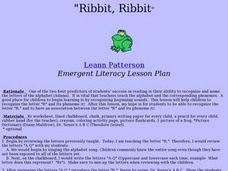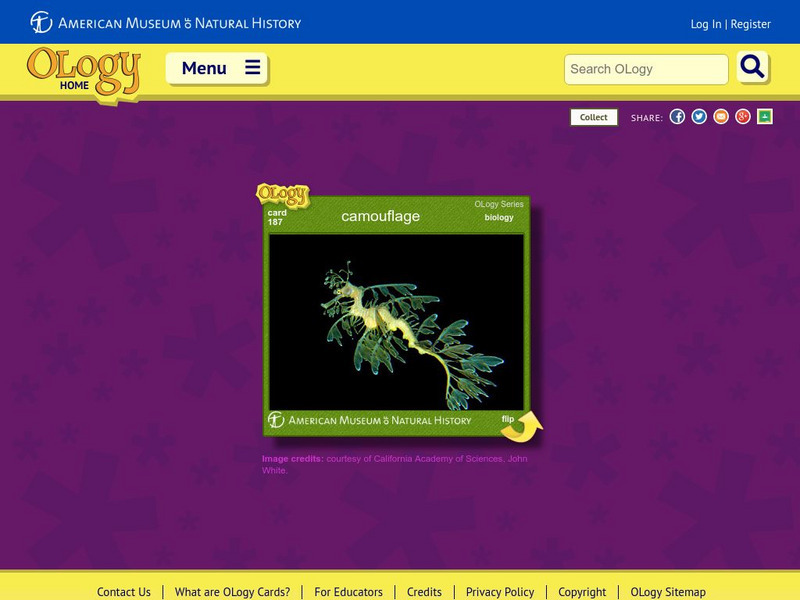Curated OER
Color Your World with Changes --- the Camouflage Game
Seventh graders, after predicting dominant colors foud in their habitat or garden, visit heir area on a monthly basis. They search for colored toothpicks, then graph the results, determining the dominant color for the month.
Curated OER
Animals Dotted Tracing Activity
In this tracing worksheet, students trace 3 words related to animals: adapt, camouflage and habitat. A reference web site is included for additional activities.
Curated OER
Discovering Owls
Students are introduced to different types of owls and owl pellets. They list several adaptations that benefit the owls. Students identify the various species of owl that live in Wisconsin. Students discuss owl pellets and identify the...
Curated OER
Animals Alphabetical Order
In this animals worksheet, students put names of animals into alphabetical order. Students put 15 animal names into alphabetical order.
Curated OER
Ribbit! Ribbit!
Students research a frog's life cycle and habitat using books, the Internet and lecture. Students make origami frogs, write letters to Toad from Arnold Lobel's "Frog and Toad" and participate in a simulated camouflage activity.
Curated OER
Chalkboard Challenge
Here's a terrific Jeopardy-style game that's designed for 3rd and 4th grade students of science. The topics include living things, animals, plants, matter, and "hodge-podge." The questions are all age appropriate, and there is an...
Curated OER
Natural Selection
Kids act as scientists and preditors in this short natural selection activity; they collect and analyze data, then apply their new knowledge to real-world examples of natural selection. The layout of the worksheet is easy enough to use...
Curated OER
How to Tame a Field Trip to the Zoo
Keep your pupils focused on field trip learning objectives with before, during, and after activities.
Curated OER
Where Are The Dinosaurs?
Students study the existence of dinosaurs as a precursor to learning about extinction. In this dinosaurs lesson, students watch dinosaur video at assigned web sites. They discuss what they observed in the videos including how the...
Curated OER
Follow a Fish
Students choose a fish from anywhere within the Ocean Center. They observe it for a given time, recording its behavior. Students comprehend the concept that living things have individual characteristics that enable them to live in their...
Curated OER
Prairie Predator and Prey
Fifth graders brainstorm a list of animals that live on the prairie, and classify them as predators and prey. They conduct interviews where they ask the animals what they need to look out for to sustain life on the prairie.
Curated OER
Who Eats Whom in the Salt Marsh?
Seventh graders complete a virtual online salt marsh tour. In groups, they observe and identify the various types of animals found in the marsh. After categorizing the animals, they create a food web based on the animals role in the...
Curated OER
Wildlife Habitat
Students explain what a habitat is and describe its four elements. They see how an area's habitat suitability varies with different species of wildlife. They name factors that affect habitat suitability.
Curated OER
Critter Encounter Chart
Students record data found at an assigned web site. In this data collection lesson, students access an assigned web site in order to complete a data chart about animals they see. They travel to different sections of the web site to find...
Curated OER
Life Science Review for Grade 4
In this life science review for grade 4 worksheet, 4th graders answer 25 multiple choice questions in standardized test format about life science.
Curated OER
Humane Science Projects
In this science worksheet, students examine the list of possible science projects. They look for the characteristics that set apart these ideas as humane.
Curated OER
Survival of the Fittest
Sixth graders create their own "never before seen" marine creatures and examine how not all creatures in the sea swim, not all have sharp teeth
Curated OER
Creatures That Glow In The Night
High schoolers investigate the different bioluminescent organisms. They use microscopes in order to make observations and draw what is seen. Students demonstrate they have studies the differences between the process of photosynthesis and...
Utah Education Network
Uen: Animal Adaptations
A multitude of activities provide help with understanding animal adaptations.
American Museum of Natural History
American Museum of Natural History: Camouflage O Logy Card
Flip this interactive OLogy card to start learning about camouflage and the role it plays in helping animals survive.
PBS
Pbs Learning Media: Seeing Through Camouflage
This interactive feature from the NOVA: "Leopards" Web site presents a wide variety of ways in which animals use coloration to their advantage.
Scholastic
Scholastic: Study Jams! Science: Animals: Animal Adaptations
A video and a short multiple-choice quiz on the topic of animal adaptations, that look at physical and behavioral adaptations.
Exploratorium
Exploratorium: Frogs, a Disappearing Act
At this site students can read about how frogs camouflage to avoid predators. There is an interactive exhibit too! (Must have the Shockwave plug-in to see animation.)
Online Learning Haven
Online Learning Haven: Animals and Adaptation
This general site defines adaptation and sites examples of some of the best examples of adaptation found in the animal world. Related articles are found at the bottom of this site.





















